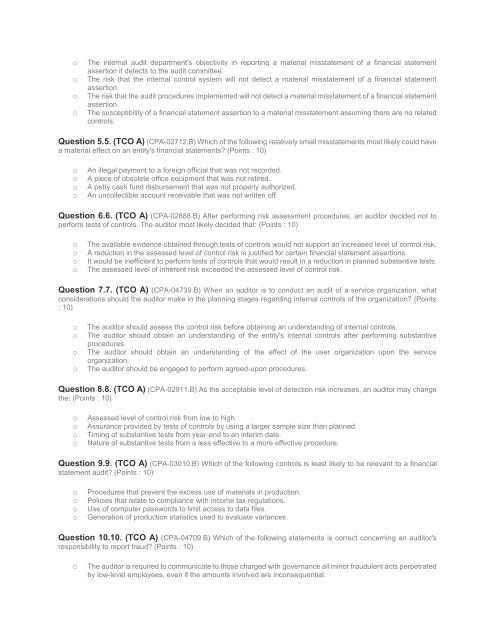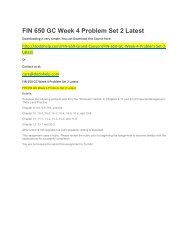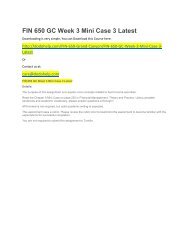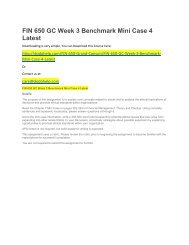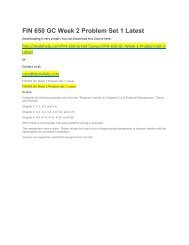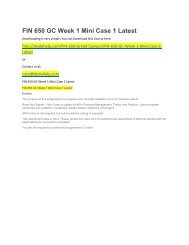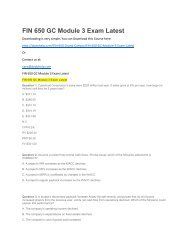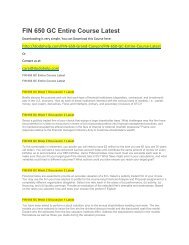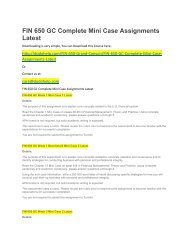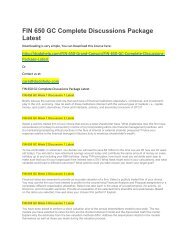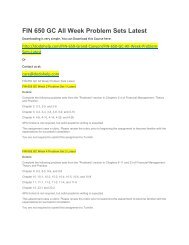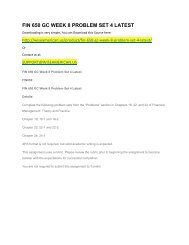ACCT 591 DeVry Week 3 Quiz Latest
Create successful ePaper yourself
Turn your PDF publications into a flip-book with our unique Google optimized e-Paper software.
o<br />
o<br />
o<br />
o<br />
The internal audit department's objectivity in reporting a material misstatement of a financial statement<br />
assertion it detects to the audit committee.<br />
The risk that the internal control system will not detect a material misstatement of a financial statement<br />
assertion.<br />
The risk that the audit procedures implemented will not detect a material misstatement of a financial statement<br />
assertion.<br />
The susceptibility of a financial statement assertion to a material misstatement assuming there are no related<br />
controls.<br />
Question 5.5. (TCO A) (CPA-02712.B) Which of the following relatively small misstatements most likely could have<br />
a material effect on an entity's financial statements? (Points : 10)<br />
o<br />
o<br />
o<br />
o<br />
An illegal payment to a foreign official that was not recorded.<br />
A piece of obsolete office equipment that was not retired.<br />
A petty cash fund disbursement that was not properly authorized.<br />
An uncollectible account receivable that was not written off.<br />
Question 6.6. (TCO A) (CPA-02888.B) After performing risk assessment procedures, an auditor decided not to<br />
perform tests of controls. The auditor most likely decided that: (Points : 10)<br />
o<br />
o<br />
o<br />
o<br />
The available evidence obtained through tests of controls would not support an increased level of control risk.<br />
A reduction in the assessed level of control risk is justified for certain financial statement assertions.<br />
It would be inefficient to perform tests of controls that would result in a reduction in planned substantive tests.<br />
The assessed level of inherent risk exceeded the assessed level of control risk.<br />
Question 7.7. (TCO A) (CPA-04739.B) When an auditor is to conduct an audit of a service organization, what<br />
considerations should the auditor make in the planning stages regarding internal controls of the organization? (Points<br />
: 10)<br />
o<br />
o<br />
o<br />
o<br />
The auditor should assess the control risk before obtaining an understanding of internal controls.<br />
The auditor should obtain an understanding of the entity's internal controls after performing substantive<br />
procedures.<br />
The auditor should obtain an understanding of the effect of the user organization upon the service<br />
organization.<br />
The auditor should be engaged to perform agreed-upon procedures.<br />
Question 8.8. (TCO A) (CPA-02911.B) As the acceptable level of detection risk increases, an auditor may change<br />
the: (Points : 10)<br />
o<br />
o<br />
o<br />
o<br />
Assessed level of control risk from low to high.<br />
Assurance provided by tests of controls by using a larger sample size than planned.<br />
Timing of substantive tests from year-end to an interim date.<br />
Nature of substantive tests from a less effective to a more effective procedure.<br />
Question 9.9. (TCO A) (CPA-03010.B) Which of the following controls is least likely to be relevant to a financial<br />
statement audit? (Points : 10)<br />
o<br />
o<br />
o<br />
o<br />
Procedures that prevent the excess use of materials in production.<br />
Policies that relate to compliance with income tax regulations.<br />
Use of computer passwords to limit access to data files.<br />
Generation of production statistics used to evaluate variances.<br />
Question 10.10. (TCO A) (CPA-04709.B) Which of the following statements is correct concerning an auditor's<br />
responsibility to report fraud? (Points : 10)<br />
o<br />
The auditor is required to communicate to those charged with governance all minor fraudulent acts perpetrated<br />
by low-level employees, even if the amounts involved are inconsequential.


